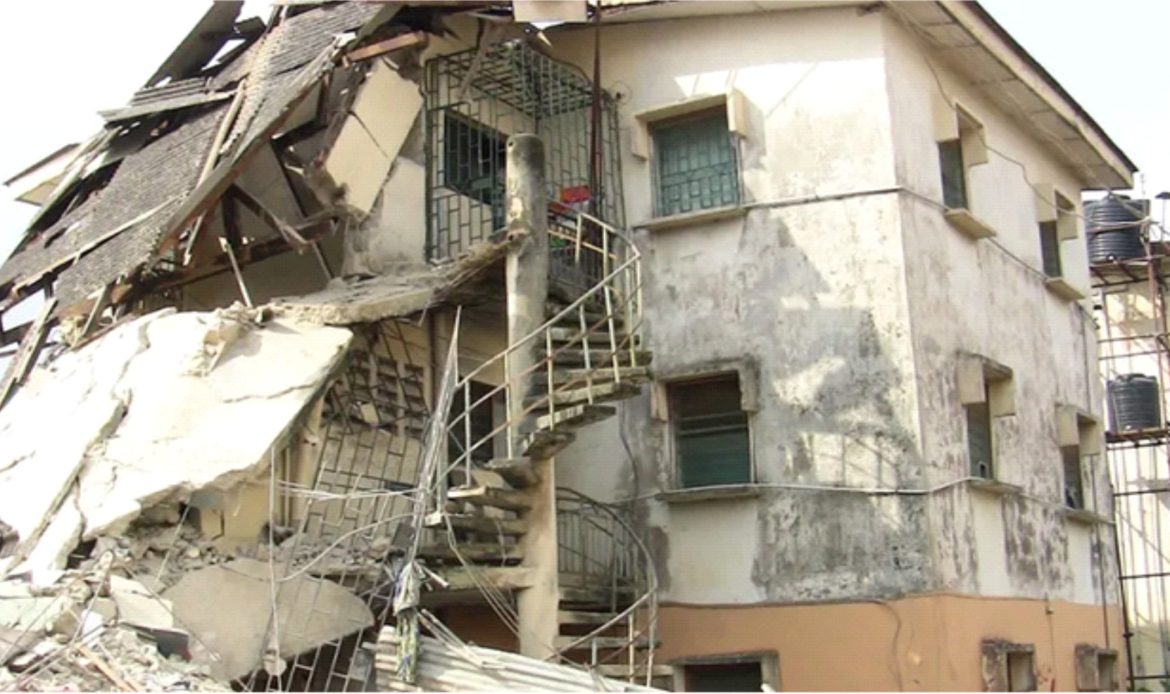Why buildings collapse
By Adetokunbo Abiola
A 52-year-old Ademola Lawrence died in Okitipupa in Okitipupa Local Government area of Ondo State after a dilapidated school building collapsed on him early in September. A landlord tried to help pull down one of the dilapidated structures at the L. A. Primary School, Okitipupa to make way for a new structure, but while work was ongoing, the building suddenly caved in on the carpenter, killing him instantly, witnesses reported.
On September 4, no fewer than six persons got trapped in the rubble of a seven-storey building that collapsed close to the Sand Field bus stop in the Lekki area of Lagos State.Emergency responders got deployed to commence rescue operations at the scene of the incident, trying to rescue six people said to be trapped to the ground.
On September 22, sympathizers rescued two persons from the debris of the three-storey building that collapsed on Sonuga Street, Palm Avenue, in the Mushin area of Lagos State, on the heels of the seven-storey building that collapsed at Lekki.
Once again, buildings collapse on the heels of one another, telling us that building collapses have become a worrisome occurrence in the country. Last November, at least five people died after a multi-story building collapsed in Lagos. Sadly, Nigeria recorded not less than 43 cases of building collapses in 2019, according to figures obtained from The Building Collapse Prevention Guild, an advocacy group of building professionals. Lagos recorded the highest figure with 17 cases, about 39.53% of the total number of collapsed buildings. Anambra State got the second-highest number with six collapsed buildings while Plateau and Delta States recorded three each. Oyo, Enugu, Ondo and Osun States recorded two collapsed buildings each in 2019, while Imo, Kwara, Abia, Adamawa and Katsina States each had one building collapse incident.
The use of defective or substandard building materials, lack of requisite technical knowledge, non-adherence to building regulations, lack of maintenance, use of non-professionals and the high level of corruption lie behind the documented cases of building collapse in Nigeria, say experts.
Developers try to save money that should be spent on foundations when building, aiming to cut cost to half the price of a building, said a professor of civil engineering Anthony Ede at Covenant University in Ota, Nigeria . Consequently, buildings get saddled with weak foundations, which end up in them collapsing under a little pressure from the environment.
The landlord tampered with the Okitipupa building mentioned earlier, wanting to reconstruct the ground floor to flats from room and parlour, unconcerned about whether it would affect the entire building, said an eyewitness to the incident. Unfortunately, nemesis caught up with him, resulting into the collapse of the entire building, killing him in the process.
These form the major reasons for the collapse of entire buildings in many parts of the country. In addition, building materials such as reinforcing steel, cement, sand and granite play important roles in either the collapse or stability of buildings in Nigeria. Unfortunately, say experts, 10-25% of buildings that collapse in Nigeria come as a result of the use of poor quality building materials, causing many unforeseen consequences.
Anecdotal evidence from various government agencies revealed that between 1974 and 2019, over 221 buildings collapsed across various Nigerian cities and more than half of the collapses occurred in the economic hub of Lagos. The city bore the brunt of 167 cases between 2000 and 2021, with 79 nine percent of them residential buildings flats, 12.8 percent commercial, and the remaining 8.8 percent institutional buildings.
Through building collapse, 6,000 people got displaced, with properties worth $3.2 billion lost. Another statistics from 1974 to July 2021 show that over 461 buildings have collapsed in Nigeria, with over 1,090 deaths recorded and many injured. Over the years, Lagos recorded over 295 cases, Abuja 16, Oyo, 16, Anambra 15, Kano 9 and Ondo 10.
In essence, states record huge number of collapsed buildings, and when the economic costs get computed, the loss becomes unimaginable. For instance, over the forty-seven- year period mentioned earlier, Abia recorded nine building collapses, Kwara eight, Rivers eight, Delta eight, Enugu seven, Ogun seven, Plateau six, Kaduna six, Edo six, Imo five, Osun five Benue three , Adamawa three, and Ebonyi three. Others are Niger two, Kebbi two, Ekiti two, Cross River two, Sokoto one, Bauchi one, Akwa-Ibom one, Kogi one and Katsina one.
The Ondo State government through the Ministry of Physical and Urban Development wants to strengthen the monitoring and compliance of builders with approved specifications in building designs, according to the Commissioner for Lands and Infrastructure, Raimi Aminu, an engineer, while fielding questions from journalists on how to halt building collapses. One of the criteria for granting building approval for a proposed building design would be the stamping by a competent engineer after which the ministry would check for conformity with specifications, he said.
The Standard Organisation of Nigeria (SON) should increase its effort to sanitize building materials in the market, said Busayo Aderounmu, an economics lecturer at Covenant University, Ota, Ogun State, on how to halt building collapses. In addition, investors and building owners should be educated on the risk of collapsing due to the use of sub-standard materials in the building construction process, he said.

Over the past few decades, a lot of talk comes up about the need to use standardized materials in the building construction process, yet people find ways to circumvent the rule. Perhaps the resurgence of building collapses in the country will teach them that something inevitably goes wrong when people try to circumvent the due process of building construction.










